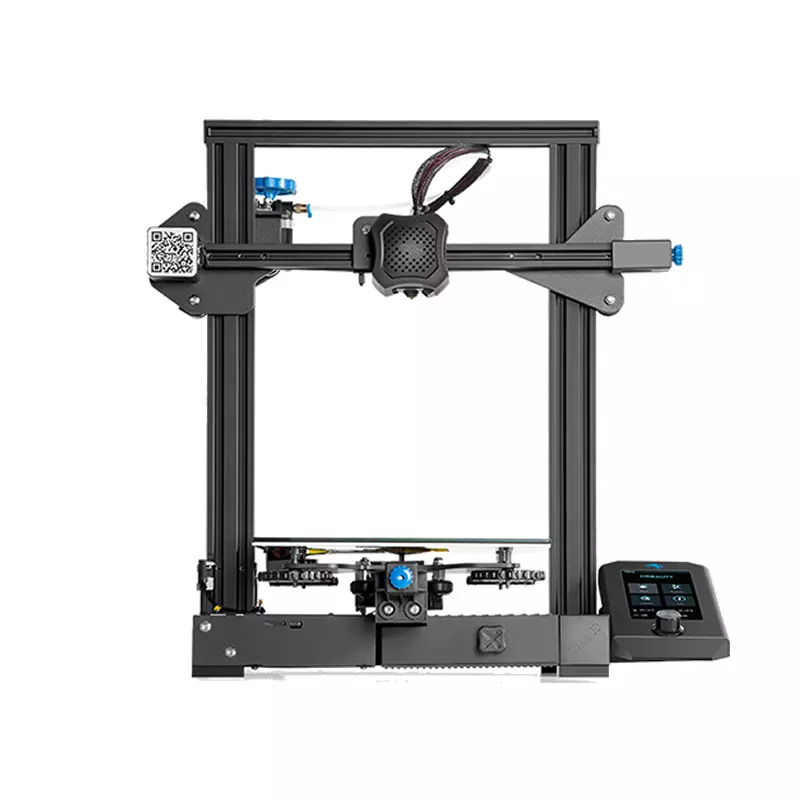Compare Ender 6 vs Ender 3 V2
Comparison between the best 3D printers
Choose the best 3D printer at the best price. The cheapest 3D printers are here.
Buy a 3D printer here with 3D Fila.
 |
 |
|
| Model | Ender 6[BUY Ender 6] |
Ender 3 V2[BUY Ender 3 V2] |
| Printing Material | Filament | Filament |
| Buy Filament for Creality 3D Ender 6 | Buy Filament forCreality 3D Ender 3 V2 | |
| Estimated price | $499,00 | $289,00 |
| Manufacturer | Creality 3D | Creality 3D |
| Release Year | 2020 | 2022 |
| Print Volume [mm] | 250x250x400 | 220x220x250 |
| Printer Size [mm] | 495x495x650 | 470x475x620 |
| Weight [kg] | 22 | 7,8 |
| Power Loss Recovery | YES | YES |
| Enclosed printer | YES | NO |
| Bed Leveling | Manual | Manual |
| Filament End Sensor | YES | NO |
| Bed type | Heated | Heated |
| Power supply system | Bowden | Bowden |
| Standard nozzle | 0,4 | 0,4 |
| Maximum Nozzle Temperature [°C] | 260 | 255 |
| Maximum Bed Temperature [°C] | 100 | 100 |
| Maximum printing speed [mm/s] | 150 | 180 |
| Filament holder | YES | YES |
| Camera for supervision | NO | NO |
| Recommended filaments | PLA, TPU, ABS, PETG | PLA, TPU, ABS, PETG |
| Recommended slicers | Cura, Simplify, Slic3r | Cura, Simplify, Slic3r |
| Maximum Resolution [mm] | 0,1 | 0,1 |
| Processor | 32 bits | 32 bits |
| Display | Touchscreen TFT 4,3'' | Touchscreen TFT 4,3'' |
| Power Supply | 24V / 504W | 24V / 360W |
| Connectivity | SD / USB | SD / USB |
| Operating systems | Windows, Mac, Linux | Windows, Mac, Linux |
| Date of registration in the system | 2021-04-15 | 2021-04-15 |
| Release date | 2020 | 2022 |
| Extra features | The Creality Ender 6 stands out in the world of 3D printers with its CoreXY system, offering fast and high-quality prints. With a robust design, it has acrylic panels to protect against air currents, optimizing the printing of materials that require higher temperatures. It features a generic Creality hotend, effective up to ~240°C. Its differentials include 10mm GATES belts, promoting stability at high speeds, and a 360W power supply for reliable performance. The machine also has an intuitive user interface through a 4.3-inch touchscreen. | The Creality Ender-3 V2, with a design inspired by the Prusa i3 series, stands out for its DIY assembly structure. With an area of ??250x250x250mm, it supports a variety of projects. It has a micro-USB port, microSD slot and integrated tool drawer. The tension adjustment adapts to different regions. Its manual print bed leveling process requires attention, but offers an enriching experience. Ideal for 3D printing enthusiasts willing to invest time in assembly and adjustment. |
| Support for multiple colors and materials (AMS and CFS) | NO | NO |
Notes * |
||
| Cost-benefit | 7 / 10 | 7 / 10 |
| Hardware | 2.5 / 10 | 1.8 / 10 |
| Tela | . | . |
| Print volume | 4 / 10 | 3 / 10 |
| Performance | 1 / 10 | 1 / 10 |
| [BUY Ender 6] | [BUY Ender 3 V2] |
Conclusion |
| When comparing the Creality Ender 6 and the Ender 3 V2, both models cater to different users with distinct needs and priorities, especially regarding budget and print capabilities. The Ender 6, with its higher price point, offers several advanced features that justify the investment. It boasts a larger print volume and a fully enclosed build, making it suitable for printing high-temperature materials. The CoreXY system enhances speed and stability, leading to high-quality prints. Additionally, features like a filament sensor and a robust design help to mitigate common printing issues, making it an appealing choice for users who intend to engage in more complex and larger-scale projects. On the other hand, the Ender 3 V2 serves as an excellent entry-level printer that balances functionality and affordability. While it has a smaller print volume and lacks an enclosure, it appeals to DIY enthusiasts who enjoy assembling and calibrating their machines. It also provides essential features like heated beds and dual connectivity options, making it a well-rounded choice for beginners or casual users looking for a dependable 3D printing experience at a more accessible price. In summary, if the priority is speed, stability, and the ability to print with higher temperature materials, the Ender 6 is the superior option despite its higher cost. However, for those seeking a cost-effective solution that still delivers solid performance for smaller projects, the Ender 3 V2 remains a strong contender. Ultimately, the decision should reflect the user's specific needs, experience level, and willingness to invest time and resources into their 3D printing venture. |

